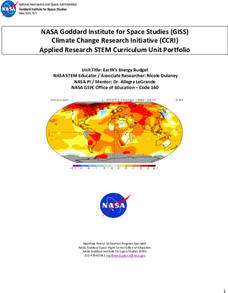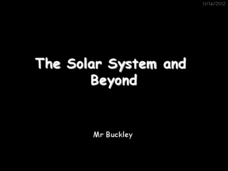Core Knowledge Foundation
A Time for All Seasons - Fall
The weather is cooling down and the leaves are starting to change color; fall is right around the corner. Celebrate this special time of year with this earth and life science lesson series that teaches children about the causes of...
Core Knowledge Foundation
A Time for All Seasons - Summer
The sun is shining and the birds are singing, what better time to teach young learners about the fun season of summer. In this week-long science series, children learn how the rotation and orbit of the earth influence the days and...
Curated OER
Tilted Earth
What causes Earth's seasons? Find out through a series of anticipatory questions, an easy yet powerful activity representing the sun-Earth system, a diagram to label, and follow-up questions. Dispel the misconceptions about Earth being...
NASA
Earth’s Energy Budget
Take the time and energy learn about Earth's energy budget. An engaging unit of four lessons focuses on the components that make up Earth's energy budget. Future scientists come up with a formula for the energy budget, then use software...
Scholastic
Lesson Three: The Earth, Movement in Space
If you feel like you're standing still, you're wrong! The Earth is constantly rotating and orbiting under our feet. Demonstrate the Earth's movement within the solar system with a collaborative activity. With a candle or lamp in the...
Illustrative Mathematics
Tilt of Earth's Axis and the Four Seasons
Geometry meets earth science as high schoolers investigate the cause and features of the four seasons. The effects of Earth's axis tilt features prominently, along with both the rotation of the earth about the axis and its orbit about...
Curated OER
The Earth and Beyond
Photographs and graphics bring the solar system and Earth to life in this presentation. Viewers are taken on a virtual field trip, beginning with the sun and planet placement, and proceeding through both Earth and the moon's movements....
PBS
Why Do We Have Seasons?
Explore the reason for the seasons! An interactive lesson allows learners to explore the earth's rotation from the viewpoint of four cities at different latitudes. It provides descriptive information at eight points during the orbit...
Curated OER
Reasons for the Seasons
This worksheet requires the pupils to follow a teacher activity, so more-than-the-usual preparation for a practical is needed. Looking at a globe as it rotates and receives "sunlight" from a flashlight, pupils are able to observe the...
US Environmental Protection Agency
Carbon Through the Seasons
Meteorologists view an animated video by the Environmental Protection Agency to learn how the carbon cycle works, and then move into groups to analyze and graph actual data of the atmospheric carbon dioxide concentration from Hawaii's...
Core Knowledge Foundation
A Time for All Seasons - Winter
As the days get shorter and a chill enters the air, it's time to start teaching your little ones about the wondrous winter season. Through a series of teacher demonstrations, whole-class read alouds and discussions, and hands-on...
Core Knowledge Foundation
A Time for All Seasons - Spring
Celebrate the arrival of spring with this fun primary grade science unit. Engaging young scientists with a variety of hands-on activities and inquiry-based investigations, these lessons are a great way to teach children about seasonal...
Curated OER
Modeling the Seasons
Junior geologists become the force that makes the world go around! With a lamp on the floor in the middle of the room to represent the sun, volunteers hold a globe, revolve, and rotate. Observers notice how the light hitting the globe...
Purdue University
Global Design for the Seasons
People don't all get the same amount of sun at the same time of the year. Collaborative groups explore how the motion of Earth contributes to the idea in an inquiry-based STEM lesson. Learners first investigate how the rotation of Earth...
Curated OER
Seasons and Day Time
Learners label a diagram of the Earth rotating about the sun and indicate the direction of the rotation and the seasons at each location. They indicate the seasons, the poles, the hours of daylight at each pole, the direction of rotation...
It's About Time
How Do Earth's Orbital Variations Affect Climate?
How does Earth's orbit around the Sun affect climate? This third installment of a six-part series looks at how Earth's orbit affects the amount of insolation at locations on Earth involves different experiments used in conjunction...
Curated OER
The Reason for the Seasons
Students compare graphs of their data that was generated on a NASA website. For this seasons lesson students complete a lab activity.
Curated OER
Regents High School Examination: Physical Setting Earth Science 2006
Test your class on earth science with this extensive resource. This test, created by The University of the State of New York Regents, is made up of 50 multiple choice questions and 32 short answer questions that cover the branches of...
NorthEast Ohio Geoscience Education Outreach
Earth, Sun and You
Middle schoolers model Earth's revolution round the sun by walking a mini-globe around a lamp. You will assess whether or not they tilt and rotate the planet properly and that the revolution is counterclockwise. Discussion beforehand...
Curated OER
The Solar System and Beyond
Survey the solar system by viewing this PowerPoint. Amateur astronomers discover that gravity is responsible for Earth's orbit around the sun and the moon's orbit around Earth. They explore the moon's phases and Earth's seasons. This...
Stanford University
Solstice and Equinox Season Model
How can December 21 be the shortest day of the year when all days are 24 hours long? Pupils see how to build a model showing the differences between winter and summer solstices and equinoxes. Using this model, classes can then discuss...
Curated OER
Exploring Seasonal Shadows and Sunlight
What can shadows tell us about the changing season? Over several months, astronomy learners record length and position of an outdoor object's shadow, such as a flagpole. They apply the data to a growing hypothesis and note the patterns...
Curated OER
Our Solar System and Seasons
Sixth graders investigate the relative diameters of planets and distances between them and the cause for seasons on Earth using the 5-E Learning Model. They appreciate the size and distances involved with objects in the real universe....
California Academy of Science
Kinesthetic Astronomy: Longer Days, Shorter Nights
A lamp, four globes, and some signs taped around the room are all you need to set up a solar system simulation for teaching how Earth's tilted axis creates the seasons. (Sticky dots are also needed, but not mentioned in the materials...

























